Introduction:
Medicine is often regarded as the crown jewel of professional pursuits in Pakistan, commanding immense respect and social prestige. It’s no surprise that it remains the most sought-after career path among the nation’s youth. With a robust and expansive medical education infrastructure, Pakistan boasts 138 medical colleges serving a population of over 220 million people. These institutions are spread across the country, with Punjab leading with 69 medical universities, followed by Sindh and Khyber Pakhtunkhwa, each with 32, and Balochistan with 6 medical colleges.
The public-private distribution is particularly noteworthy, with 94 private institutions complementing 44 public sector medical universities. Together, they are collectively producing over 32,000 doctors annually, reflecting Pakistan’s comprehensive network of medical institutions and its commitment to healthcare education. Many of these universities trace their origins back to the pre-partition era, showcasing a long history of dedication to education.
The Intense Competition for Admission
For aspiring medical professionals, the competition for admission is extraordinarily intense, especially in prestigious public institutions like King Edward Medical University and Aga Khan University, where acceptance rates often fall below 2%. Navigating this landscape of opportunities requires not only academic excellence but also a thorough understanding of the admission processes and requirements. This guide aims to explore these aspects in detail, helping students prepare effectively.
A Closer Look at Pakistan’s Medical Education
According to a recent survey, Pakistan produces 32,879 doctors per year from 114 medical universities situated across the country. Among these, seventy medical colleges are private institutes, while forty are public institutes. These best medical colleges are known for their rigorous training and instruction, making them ideal for those pursuing a career in medicine.
Choosing the Right Medical College
Choosing the best private medical college in Pakistan can be a daunting task, given the numerous options available. Factors such as quality of education, faculty, infrastructure, clinical exposure, and fee structure play a significant role in this decision. Private medical colleges in Pakistan have garnered a reputation for their rigorous academic standards and commitment to producing competent healthcare professionals.
A Personal Perspective
Hey there, future doctors! If you’re pursuing medicine in Pakistan, you’re in the right place. The inside scoop on the best private medical colleges in Pakistan can set you up for success in 2025 and beyond. Whether you’re dreaming of donning that white coat in Lahore, Karachi, or anywhere in between, these top-notch institutions are your ticket to a stellar medical education. With cutting-edge facilities and world-class faculty, these colleges truly stand out.
Pakistan’s medical education is highly valued and sought after, offering a plethora of opportunities. For students aiming to pursue a career in medicine, choosing the right medical college is a critical decision that can shape their future. For more information, consider visiting Pakistan’s Medical Education Guide.
What is MDCAT
If you’re a student dreaming of pursuing MBBS (Bachelor of Medicine and Bachelor of Surgery) or BDS (Bachelor of Dental Surgery) in Pakistan, the MDCAT (Medical and Dental College Test) is your first step. This paper-based exam, conducted annually by the PMDC (Pakistan Medical and Dental Council), is the key to securing admission in top-tier private medical colleges and public medical colleges across the country, including prestigious institutions like AKU, KEMU, UHS, DUHS, KMU, LUMHS, AIMC, PMC, RMU, RMC, and AMC.
The MDCAT exam consists of 200 MCQs, designed to test your knowledge and aptitude. According to the latest PMDC regulations, the exam is divided into 5 sections: Biology, Chemistry, Physics, English, and Logical Reasoning. One of the best parts? There’s no negative marking, so you can attempt every question without fear.Preparing for the MDCAT requires focus and strategy. From my experience, students often underestimate the importance of balancing all 5 sections. While Biology and Chemistry are crucial, don’t ignore Physics, English, or Logical Reasoning. Each section plays a vital role in your overall score, and mastering them can make all the difference in securing a seat at your dream medical college or dental college
What is the eligibility criteria for MBBS admission in Pakistan?
To pursue MBBS in Pakistan, candidates must have completed their intermediate or equivalent education from a recognized institution with a minimum of 70% marks. Additionally, they must have studied Biology, Chemistry, and Physics at the intermediate level. These requirements ensure that students have a strong foundation in the sciences, which is essential for success in medical studies.
What Makes a Medical University Stand Out?
When it comes to ranking medical universities in Pakistan, several factors come into play. These include academic reputation, faculty expertise, research output, state-of-the-art facilities, and ample clinical training opportunities. Universities that make a significant overall contribution to the healthcare sector are often ranked higher. For students who have just finished their pre-medical studies, it’s crucial to prefer institutions that excel in these mentioned factors.
Choosing the Right University
The list of universities considered the best is picked based on how well they fit into the criteria of being top medical universities. From my experience, students often focus solely on academic reputation, but it’s equally important to consider faculty expertise and clinical training opportunities. These elements play a vital role in shaping a student’s medical career and ensuring they receive a well-rounded education.
Top 5 medical college in Pakistan
1. Aga Khan University – Karachi
In 1983, Aga Khan University (AKU) was established in Karachi, marking a significant milestone in Pakistan’s medical education landscape. Over the years, AKU has garnered international recognition for its world-class research facilities and modern curriculum, positioning it among Asia’s top medical institutions. The university offers a comprehensive medical curriculum, emphasizing clinical training and research output, particularly in Medicine, Nursing, and Public Health.
AKU’s state-of-the-art teaching hospital is equipped with the latest medical technologies, providing students with extensive clinical training opportunities. The facilities include advanced laboratories, a modern library, and multi-specialty units that cater to a diverse range of medical disciplines. This infrastructure supports the university’s commitment to high academic standards and its role as a leader in community health within the region.
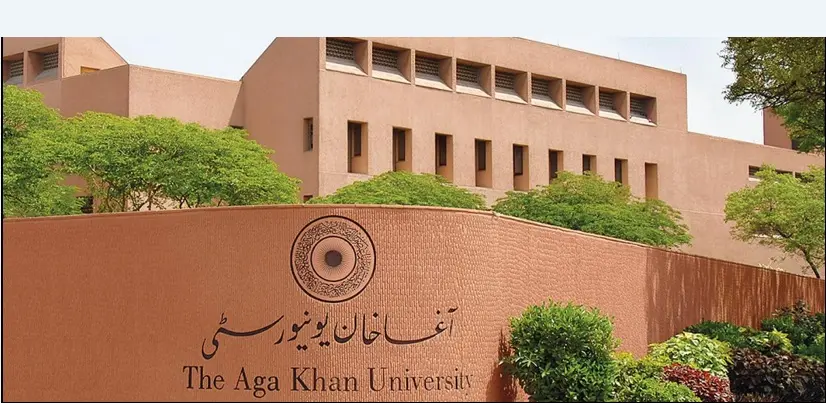
Students at AKU benefit from a supportive learning environment that fosters a diverse student body and encourages community service. Engagement in extracurricular activities enhances their overall experience, contributing to high levels of student satisfaction. The university’s focus on academic reputation and comprehensive medical education ensures that graduates are well-prepared to meet the evolving challenges in the medical field.
Aga Khan University Admission Criteria
Application Process:
- Candidates must apply online through the official Aga Khan University (AKU) admissions portal.
- Submission of Secondary School mark sheets and Higher Secondary School mark sheets is required, depending on the candidate’s high school completion status.
Admission Test:
- All applicants are required to take the AKU Test, which includes sections on English and Mathematics.
- The FAS Admission Test is conducted at various centers in Pakistan and overseas centers.
- Performance in the AKU Test is a key factor in short-listing FAS candidates.
Admission Procedure:
- AKU conducts its own admission test and does not accept MDCAT scores.
- Eligibility requires a minimum 75% marks in A-levels or FSc.
- Candidates undergo Multiple Mini Interviews (MMI) as part of the selection process.
- Merit calculation is based on:
- 50% AKU Test
- 30% FSc/A-level marks
- 20% interview performance
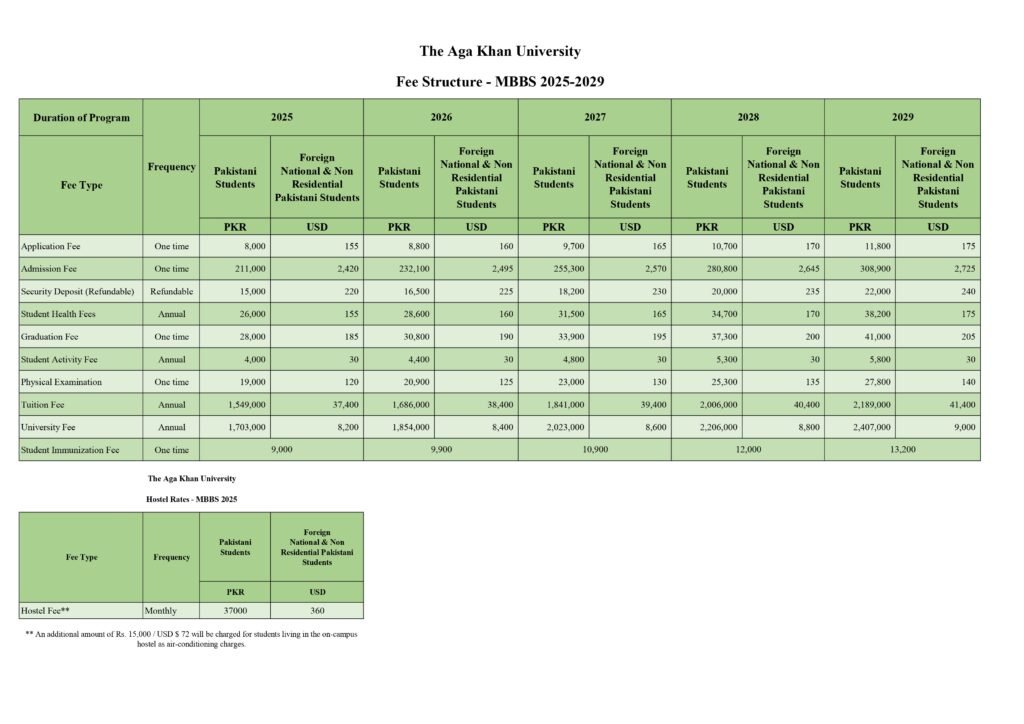
Financial Aid and International Applicants:
- Financial aid is available for deserving students to assist with tuition and other expenses.
- There is a separate admission track for international students, accommodating applicants from diverse backgrounds.
2. King Edward Medical University – Lahore
King Edward Medical University (KEMU), located in the heart of Lahore, is one of the oldest and most prestigious medical institutions in Pakistan. Established in 1860 as Lahore Medical College, it has evolved into a premier center for medical education. The university’s historic campus features state-of-the-art facilities, including Mayo Hospital, one of South Asia’s largest teaching hospitals.
KEMU offers a range of medical programs, such as the MBBS and BDS degrees, along with various postgraduate degrees. Students benefit from practical clinical training at affiliated hospitals, gaining exposure to a wide spectrum of medical issues.
Ranked No. 2 among the top 10 medical colleges in Pakistan and No. 1 in Punjab, KEMU boasts a strong legacy and high academic standards. The university provides well-equipped medical libraries, simulation labs, and access to various hospitals. High levels of student involvement in research contribute to overall satisfaction.
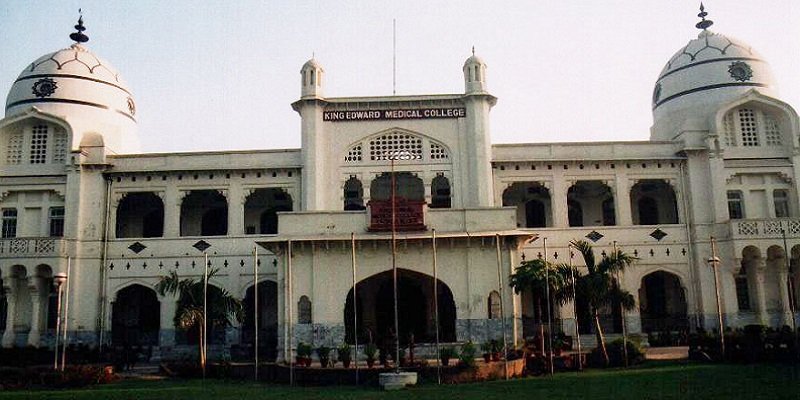
King Edward Medical University Admission criteria:
To secure admission to King Edward Medical University (KEMU) for the MBBS program, candidates must meet specific academic and examination criteria.
Academic Requirements:
- Higher Secondary School Certificate (F.Sc Pre-Medical) or an equivalent qualification with a minimum of 65% marks.
- Completion of at least 12 years of education.
Entrance Examination:
- A minimum score of 60% in the latest National Medical and Dental College Admission Test (NMDCAT) or Medical College Admission Test (MCAT).
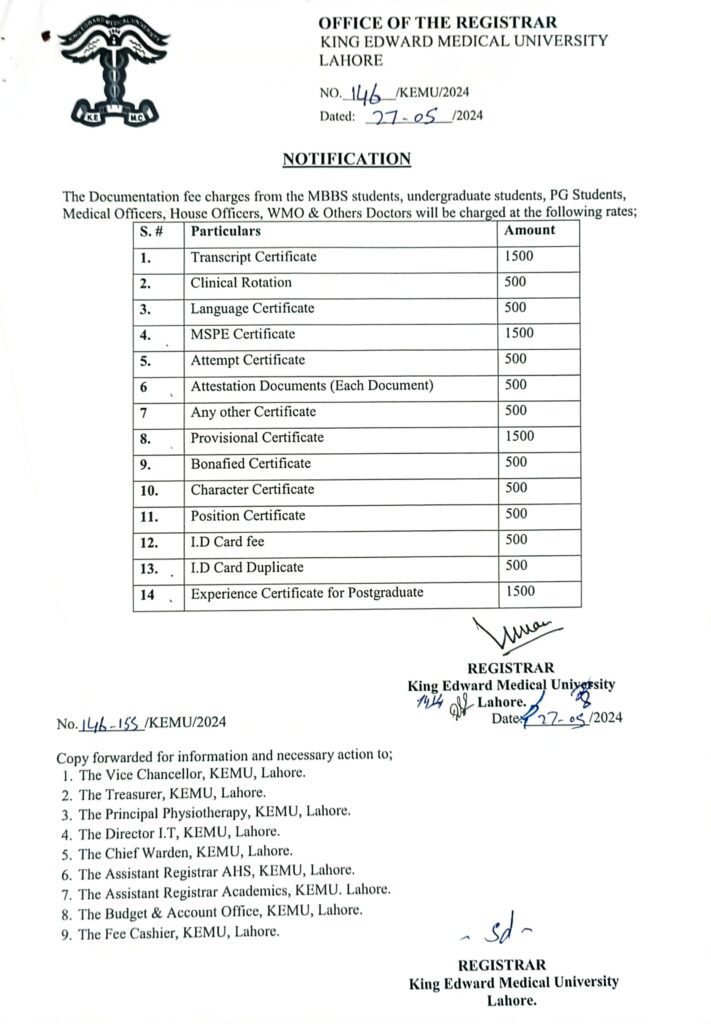
Additional Information:
- KEMU, a public medical university located in Lahore, Punjab, Pakistan, admits students to its MBBS program based solely on merit, emphasizing performance in the NMDCAT/MCAT and prior academic achievements.
Prospective students should consult KEMU’s official admissions page for the most current information and any updates to the admission criteria.
3. DOW University of Health Sciences – Karachi
Dow University of Health Sciences (DUHS), established in 1945, stands as one of Pakistan’s premier medical institutions. With a robust network comprising three medical colleges and multiple teaching hospitals, DUHS is celebrated for its innovative research initiatives and contemporary teaching approaches.
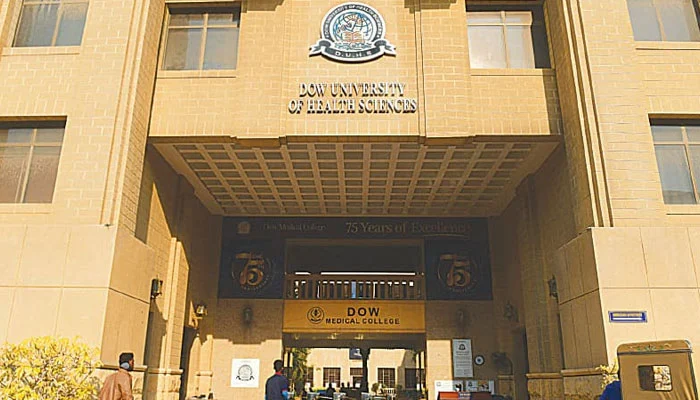
Admission Procedure for MBBS Program:
Prospective students aiming to join the MBBS program at DUHS must meet the following criteria:
- Educational Qualifications: Completion of HSSC (Pre-Medical), A-Level, or an equivalent examination recognized by the Inter Board Committee of Chairmen (IBCC) with a minimum of 60% marks, in accordance with Pakistan Medical and Dental Council (PM&DC) regulations.
- Domicile Requirements: Possession of a domicile certificate from Karachi, along with the father’s domicile of Sindh province.
- Entrance Examination: A valid passing score in the Medical and Dental College Admission Test (MDCAT) as stipulated by PM&DC guidelines.
For overseas Pakistani or foreign national applicants, additional requirements include:
- Permanent foreign nationality or dual nationality status.
- Successful completion of Biology, Chemistry, and Physics/Mathematics in the 12th-grade examination or its equivalent from an institution outside Pakistan.
- A minimum score of 550 in each subject (Biology, Chemistry, and Physics/Mathematics) in SAT-II, or a 50% score in foreign MCAT or UCAT examinations.
Fee Structure for MBBS Program (2024-2025):
The fee structure varies based on the admission category:
Open Merit:
- Admission Fee: PKR 25,000
Tuition Fee: PKR 48,000 - Examination Fee: PKR 13,000
- Library Fee: PKR 10,000
- Student Activity Fee: PKR 10,000
- University Development Fee: PKR 20,000
Optional Transport Fee: PKR 43,000
Document Verification Charges (one-time): PKR 5,000
Self Finance:
- Admission Fee: PKR 50,000
- Tuition Fee: PKR 650,000
- Other fees remain consistent with the open merit category.
Programs Offered:
- DUHS provides a diverse array of programs across various disciplines, including:
- Medicine: MBBS
- Dentistry: Bachelor of Dental Surgery (BDS)
- Nursing: Bachelor of Science in Nursing (BSN)
Allied Health Sciences: Bachelor in Public Health (BPH), Doctor of Pharmacy (Pharm-D), and other specialized programs.
Eligibility Criteria for Allied Health Programs:
For programs such as the Bachelor in Public Health (BPH), candidates must have:
- Completed HSSC (Pre-Medical) or equivalent with a minimum of 60% marks.
- Sindh domicile.
A valid entrance test score with at least 50% marks.
Fee Structure for Allied Health Programs:
- Taking the Bachelor in Public Health (BPH) as an example:
- Admission Fee: PKR 45,000
- Tuition Fee: PKR 132,000
- Examination Fee: PKR 13,000
- Library Fee: PKR 10,000
- Student Activity Fee: PKR 10,000
- University Development Fee: PKR 20,000Optional Transport Fee: PKR 43,000
- Document Verification Charges (one-time): PKR 5,000
4. Fatima Jinnah Medical University Lahore
Fatima Jinnah Medical University (FJMU), formerly known as Balak Ram Medical College, is a renowned public medical university located in Lahore, Punjab, Pakistan. Established to address the need for teaching and training female doctors, FJMU offers comprehensive programs for post-graduate students, emphasizing quality medical and healthcare facilities for the citizens of the country, particularly benefiting the female population in and around Lahore. The institution has evolved into a tertiary healthcare unit, recognized by the Higher Education Commission of Pakistan.
The university is affiliated with Sir Ganga Ram Hospital, a facility with a rich history. Sir Ganga Ram Hospital was established in 1921 in the walled city of Lahore by the philanthropist Sir Ganga Ram, who donated a piece of land for its foundation. To cope with the growing demand for medical and health care services, the hospital was shifted to its present location in 1943. On 30 June 2015, the Health Department of Pakistan changed the status of the institution from Medical College to Medical University, appointing the current principal as the vice chancellor of the university.
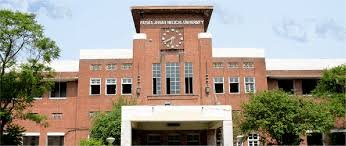
Admission Criteria for Fatima Jinnah Medical College
To secure admission to Fatima Jinnah Medical College, applicants must fulfill the following requirements:
- Basic Medical Qualification: Possess an MBBS degree or an equivalent qualification recognized by the Pakistan Medical & Dental Council (PM&DC).
- House Job Experience: Complete a one-year house job in a PM&DC-recognized institution, which is essential at the time of the interview.
- PM&DC Registration: Hold a valid registration certificate (either permanent or provisional) with the PM&DC.
- Application Process:
- Applications are invited through advertisements in print and electronic media, specifying the closing date, entry examination date, eligibility, and admission criteria.
- Applicants must complete the prescribed application form as part of the application process.
- Applications are invited through advertisements in print and electronic media, specifying the closing date, entry examination date, eligibility, and admission criteria.
5. Nishtar Medical University
Nishtar Medical University, located in Multan, is among the first medical facilities established after Pakistan’s founding. It offers degree programs in Medicine, Dentistry, Allied Health Sciences, and Nursing. The university is named after Sardar Abdur Rub Nishtar, a prominent figure in the Pakistan movement and a former governor of Punjab.
For eligibility, a student must have at least 715 out of 1100 marks in F.Sc (equivalent to 60%), with Hifz marks included. The Chairman Admission Board verifies educational documents. Applicants from Northern Areas and Azad Jammu & Kashmir take the Entry Test in Punjab for admission to MBBS and BDS programs. The age limit is under 25 years, and candidates must be holders of Punjab domicile. As a public domain institute, the total fee for the MBBS program is 40,000 PKR, with a course duration of 5 years.
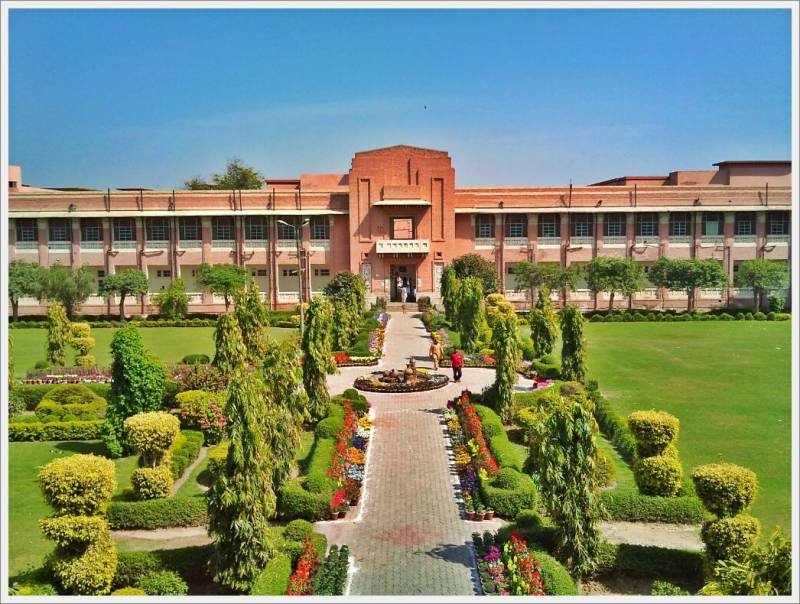
MBBS
Nishtar Medical University, Multan is an Admitting University/ Chairman Admissions Board for MBBS & BDS Admission in all Public Sector Medical Institutions of Punjab province.
You are advised to approach the Nishtar Medical University Email: info@nmu.edu.pk Website: https://nmu.edu.pk in connection with the procedure of your MBBS Admission in Public Sector Medical Institutions of Punjab province including Nishtar Medical University, Multan.
As a Foreign National/ Dual National student you are advised to approach to Economic Affairs Division, Govt of Pakistan Islamabad website http://www.ead.gov.pk for PTAP Program MBBS Seats.
For more information about Entry Test and Rules Regulations, please also visit Pakistan Medical Commission Islamabad official website https://www.pmc.gov.pk
